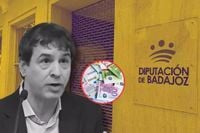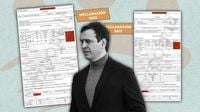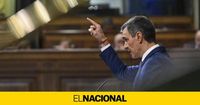In recent months, the political landscape in Spain has been rocked by allegations surrounding the family of Prime Minister Pedro Sánchez, particularly involving his brother, David Sánchez. Between 2017 and 2024, David’s wealth reportedly surged by 600,000 euros, a figure that has drawn scrutiny amid ongoing judicial investigations. These revelations have sparked intense media coverage and political debate, with the Financial Times labeling the situation as emblematic of politicized justice in the country.
David Sánchez, who has served as the Coordinator of Activities for the Music Conservatories in Badajoz since his hiring on July 10, 2017, has had a salary ranging from 48,000 to 55,500 euros annually. His financial disclosures indicate a significant increase in assets over the past several years, raising questions about the sources of his wealth. According to Vozpópuli, David’s last declaration included a palace in Elvas, Portugal, purchased for 240,000 euros in February 2023, which he attributed to a donation from his father.
The allegations against David Sánchez have escalated to a judicial process, with Judge Beatriz Biedma leading the investigation into possible influence peddling and administrative prevarication. If convicted, he could face between six months to two years in prison for the former charge and a disqualification of nine to fifteen years for the latter. This development marks a significant step in a case that has already attracted considerable media attention.
Simultaneously, the investigations have also extended to Begoña Gómez, Pedro Sánchez’s wife, who is under scrutiny for her involvement in university activities linked to potential influence peddling. The political ramifications of these investigations have been profound, with accusations of judicial harassment being leveled against right-wing groups, particularly from the Popular Party (PP). Pedro Sánchez himself has characterized the situation as a politically motivated attack, asserting that his family is being targeted.
In December 2024, amid growing political tension, Pedro Sánchez took an unprecedented five-day break to contemplate his future in office. This pause was interpreted as a reaction to the mounting pressure from ongoing investigations and the implications for his presidency. The political atmosphere has been charged, with Sánchez accusing the PP of playing “with marked cards,” implying that the opposition has privileged access to judicial information about his family.
According to the Financial Times, the intertwining of judicial investigations involving David Sánchez and Begoña Gómez has highlighted a broader issue of politicization within the Spanish judiciary. The article notes that the current climate has turned Spain into a symbol of politicized justice, with ongoing corruption cases enveloping various political figures, including those from the PP and other parties.
Among the notable cases mentioned in the Financial Times article are those involving other prominent figures like Isabel Díaz Ayuso and José Luis Ábalos, illustrating the pervasive nature of these allegations across the political spectrum. The collective Manos Limpias, known for its politically charged litigation, has played a significant role in initiating many of these investigations, further complicating the landscape.
As the investigations unfold, the implications for the separation of powers in Spain are becoming increasingly pronounced. Critics argue that the judiciary is being used as a tool of political warfare, undermining public trust in the legal system. The ongoing debates have prompted calls for reforms to limit frivolous lawsuits and prevent political parties from backing legal actions without direct evidence.
Despite these challenges, Pedro Sánchez continues to express confidence in the strength of Spain’s legal framework. He has reassured investors and international bodies of the country’s commitment to upholding the rule of law, even as his administration faces these serious allegations. The CEOE, Spain's business association, has echoed the importance of maintaining a clear separation of powers as fundamental to democracy and economic activity.
However, the controversy surrounding the judicial processes has led to a perception of a compromised judiciary, with some judges accused of being influenced by political agendas. This sentiment has been echoed by various observers, including members of the judicial associations, who highlight the ideological biases that may affect judicial decision-making.
The fallout from these investigations is likely to continue shaping the political discourse in Spain, as the implications of judicial decisions reverberate through the corridors of power. The cases against David Sánchez and Begoña Gómez are not just personal matters; they reflect broader systemic issues within the Spanish political and judicial landscape.
As the situation develops, the potential for a trial looms large, with the Badajoz Provincial Court expected to take the next steps in the judicial process. The political stakes are high, and the outcome could have lasting effects on the Sánchez administration and the future of Spanish politics.
In conclusion, the investigations into the Sánchez family have opened a Pandora's box of political tensions, judicial scrutiny, and public discourse surrounding the integrity of Spain's legal system. As the country grapples with these challenges, the interplay between politics and justice will remain a focal point for both supporters and critics of the current administration.



